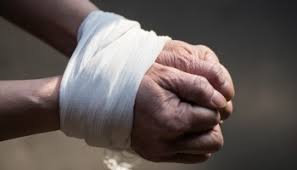My wife and recently returned from a road-trip to our former hometown where several of the people we visited were our age or older (we are both in our 70’s). We both noted afterwards how frequently we heard our friends say something like, “Our children think we are too old to do such and such, ” or “My daughter thinks I’m old enough that I should consider doing such and such.”

We asked ourselves, at what point does this kind of usually well-meaning advice by children towards their elderly parents be a form of over-controlling or bullying?
Whereas I always thought of bullying as occurring among young people—mean boys or girls abusing (bullying) other boys and girls, often with serious psychological consequences for the victims. I knew bullying was a problem and suspected that it was getting worse.
But I have been made aware that bullying doesn’t end upon reaching adulthood.
COVID PANDEMIC HIGHLIGHTED AGEISM (ELDER ABUSE)
Early in the Covid pandemic I crafted two blogposts on www.boomberout.com that pointed in the direction of my topic in this post. There was an early and disturbing indication of ageism (what could be loosely defined as elder abuse) in the nation’s early reactions to Covid. Many went so far as to seriously suggest “old people are a burden to the rest of us and should be sacrificed (and we elders should march willingly to the ICU and the morgue) so that the rest of us can return to offices, bars and beaches.”
Instead of fostering an attitude of “we’re all in this together” the “othering” of the elderly, just like “othering” Jews by Nazi Germany and “othering” Black slaves (and the continued “othering” of African-Americans by many White Americans and American institution to this day), can produce an existential threat to a society’s ability to cohere in the face of future threats.
It is not a large step to go from this contemporary society-wide demonstration of ageism in our early and ongoing response to Covid to examine the broader extent to which today’s elders are subjected to active and insipid acts of personal bullying
ELDER PARENTS BULLIED BY THEIR ADULT CHILDREN
Some one million elderly people are victims of domestic violence every year.
In as many as 40 percent of these cases, adult children victimize their parents, including psychological, physical and financial abuse. A growing number of aging baby boomers become dependent every year upon others for their care, and it is families that typically provide much of this care. Because of the normally intimate nature of the parent-child relationship, when this relationship turns abusive and becomes bullying of parents by children, it is badly underreported.
An adult child who secretly abuses their parent is often financially dependent on the elder. When the child is unemployed, or suffering from drug or alcohol abuse, the seeds are sown for abuse of the often helpless parent.
Not surprisingly, two-thirds of children abusing their parents are men. And, when the child is the sole care provide of the parent, abuse is much more likely.
WHAT DOES ABUSE OF PARENTS BY CHILDREN LOOK LIKE?
Researchers have found that 40 percent of adult children scream and/or yell at their parents to gain authority. Smaller but measurable numbers of children have used physical restraints on their parents in their care, have over-medicated or force-fed them, or have used threats of physical violence, or even struck their parents.
PLAYING THE PARENT TO THE PARENT
But perhaps there’s some other, less apparent sort of bullying occurring – that of trying to play the parent to an aging parent or parents. How many children of elderly parents, with the best of intentions, try to force their own choices of living arrangements upon them? Unless the elder’s safety is involved, experts advise children in care-taking roles should avoid making financial decisions for them, forcing them to stop driving, deciding medical issues on their behalf, and planning end of life issues.
If you are a younger boomer taking care of elderly parents, try instead to start with simple suggestions (always more effective than making demands or giving orders) that that may be more acceptable to parents than blanket instructions or commands. Put yourself in their shoes; how would you want to be treated in similar circumstance? What you’re doing to your parents is being observed by your children and is likely to be what you get!
And if your are an aging parent experiencing the sometimes well-intentioned over advising behavior or a child, practice early-on by responding calmly but firmly that, “unless my safety is at stake, I appreciate your advice but respectfully request you not hound me with it.” Simply surviving is not necessarily the end-all, but maintaining some form of agency is very, very important.
Abuse in Elder Institutions
Elder abuse can also occur in institutional settings, especially long-term care facilities, either by other patients or staff. The list of abusive behaviors perpetrated upon institutional residents is long and varied, including actual physical or sexual abuse; emotional abuse such as habitual blaming, scapegoating, or isolation from family and friends; or financial abuse from institutions getting kickbacks for referrals, overcharging or double-billing.

The AARP recommends we boomers make sure our financial and legal affairs are in order. If they are not, enlist professional with the assistance of a trusted friend or relative to help to get them in order.
If you are unhappy with the care you’re receiving, whether it’s in your own home or in a care facility, speak up. Tell someone your trust or call an elder abuse hotline.
It is already too late to design a national financing system to provide financial well-being among today’s boomers who have not accumulated the necessary resources to provide a secure old-age. We are even running out of time to think about a comprehensive solution for the Gen Xers, the oldest of whom are already in their 50’s. “We have wasted a generation. Now, the inexorable demographics of old age are about to force us to confront an historic social challenge [of financial and other abuse] for which we are unprepared. Time has run out.”
